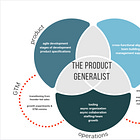What’s the difference between a marketing specialist and a marketing generalist?
The third in a new hWD series on generalist vs. specialist hires. This week? Marketing.
Part III
“Marketing is the generous act of helping others become who they seek to become. It involves creating honest stories—stories that resonate and spread.” ― Seth Godin, This Is Marketing: You Can't Be Seen Until You Learn to See
It’s no wonder from Seth’s perspective why marketing is an essential service for early-stage startups, founders who are on a mission to solve seemingly unsolvable problems in new ways to help others and make a difference. Marketing is a critical function, one that most founders find challenging to fill with the right team members in the early days. For founders who haven't run an ad campaign, launched a newsletter, or sat through a strategic brand exercise, it's easy to feel like they need everything right away.
Reframing marketing in the early days
For large corporations, specialization in various marketing aspects is vital. This might mean having individuals or whole teams specializing in emails, social, traditional, SEO, and other forms of marketing. A hybrid model of internal and external teams working together can be effective, especially when managed well.
Startups in the early stages of learning need versatile marketers capable of filling multiple roles. With generalist marketers experienced across multiple channels and capable of easily adapting to new strategies, teams can experiment before focusing on what works and diving deeper into successful channels with specialists. If startups specialize too early, they may miss out on exploring unique channels and marketing opportunities that could work well for their business. It’s still essential to choose, though; spreading resources too thin across too many verticals will not yield sufficient data for learning or create a substantial impact.
The Marketing Specialist
A Marketing Specialist is a professional with deep expertise in a specific marketing domain, focusing on areas where they excel while collaborating with other experts for tasks outside their specialization. Marketing specialists are often integral to a collaborative effort, where each member brings a distinct set of skills to the table. Marketing Specialists thrive by contributing their specialized knowledge while benefiting from the diverse expertise of teammates like copywriters, graphic designers, SEO specialists, and data analysts. This synergy ensures that every component of a marketing initiative is crafted with precision and expertise
The Marketing Generalist
Generalist marketers draw on their backgrounds in adjacent functions to stay close to the customer's needs and adapt their strategy accordingly. Emily, a lead generalist at oAT, doesn’t see herself as a traditional marketer, but as a generalist marketer who pulls on her experience in communication and customer experience to create marketing campaigns. “This results in campaigns that are more specifically designed for startups with limited budgets and tighter timeframes. By working with earned media, influencers, and using community to drive growth, we’re able to make a bigger impact that lasts over a longer time period.”
Further, a marketing generalist will also be a great operator, able to build out the necessary processes and structures within the domain while also considering how other functions operate within the organization. This can be crucial, especially for early-stage startups who have other functions that are in their nascent stages as well that inevitably intersect with marketing initiatives.
who You Need
Who you need as a marketer will likely come down to your stage and resources. Artificial intelligence is redefining roles within marketing, making tasks more efficient and allowing for faster adaptation to market changes. But we still need humans, the marketing professionals that, in the words of Seth Godin, ensure we’re building solutions that help our customers become who they wish to be. Any marketer you choose should stay informed about digital trends and peer activities to adapt marketing strategies.
It can be helpful to have a team member focused on marketing initiatives outside of the founder to start to build your channels as you're developing your product, helping you test your audience, and building community so that you are in a good spot when you launch, etc.
If you have product-market-fit and clear revenue goals, work backward. Start with your revenue goals and see where you have space for a specialized vs. generalist approach. How much time and space do you have for experimentation in marketing? You may have more room for generalized support if your sales function is up and running well.
Most startups take two approaches:
The Specialist First: Startups may start with the specialist-first path if they have a clear indication that a specific channel or strategy will work for their industry or type of company. They may go all in on specialists with one or two channels with consistency and fervor to make an impact before exploring new channels.
The Generalist First: Other startups may start with the generalist if they are looking to experiment across verticals to identify which resonates most strongly with their community.
TLDR
You can assess the need for your early org in how each profile approaches their work, measures impact, and solves problems.
Approaching Work
The Specialist: A specialist might focus more on traditional marketing techniques like paid ads, email marketing, traditional ads, social media, search, and more. For example, a content marker will only focus on specific content channels, running analyses and perfecting each channel’s efficacy as their primary focus instead of experimenting across multiple areas of growth.
The Generalist: The generalist will have broad knowledge across several verticals. They’ll bring functional expertise like PR and communications, customer experience, and community to create a more unique marketing approach that might better serve startups.
Measuring Impact
The Specialist: A marketing specialist will likely rely more heavily on data and metrics from campaigns to measure impact, looking at multiple core metrics for their particular focus.
The Generalist: In addition to data and metrics from campaigns, a generalist might also measure outcomes related to community development, earned media, and more. They’ll explore ways to measure not only the impact of specific channels but the combined impact across multiple streams of effort.
Solving Problems:
The Specialist: When faced with challenges, specialists might rely more on a traditional marketing playbook. They’ll experiment within the confines of traditional marketing methodology, and take a deeply-researched approach.
The Generalist: The generalist will likely solve problems by pulling from other areas of expertise, and act as an expert cross-collaborator to the rest of the org. When there are tight budgets or limited timeframes, this is especially helpful. “Generalists can jump in and simply get things done. They're used to being beginners, so they're very comfortable flexing into new areas when needed”, says Renata, lead generalist at oAT. “In this way, generalists minimize founder dread. We tackle problems for founders - sometimes even before they arise - by proactively seeking out problems within processes and learning how to solve them with a birds-eye view across multiple facets of marketing”.
Before you go
As you explore the dynamics between marketing specialists and generalists, it becomes evident that each plays a crucial role in the success of startups, particularly in their early stages. While specialists offer deep expertise in specific areas, generalists bring a versatile skill set that enables them to adapt to various challenges and demands. Understanding the balance between specialization and generalization is key for startups to allocate resources and maximize impact in their marketing efforts effectively. Ultimately, the choice between a specialist and a generalist depends on the stage of your startup and your specific needs, highlighting the importance of strategic decision-making in building a robust marketing strategy.
Writer: Britt






